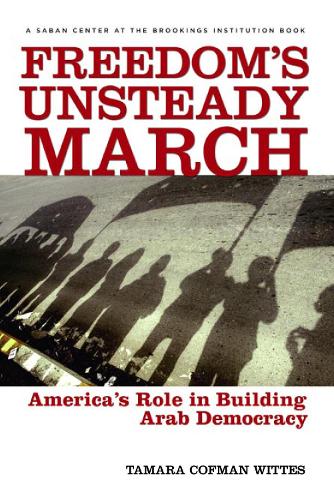
Freedom's Unsteady March: America's Role in Building Arab Democracy
Publishing Details
Freedom's Unsteady March: America's Role in Building Arab Democracy
By (Author) Tamara Cofman Wittes
Bloomsbury Publishing PLC
Brookings Institution
2nd April 2008
United States
Classifications
Professional and Scholarly
Non Fiction
Warfare and defence
Terrorism, armed struggle
327.56073
Physical Properties
176
Width 158mm, Height 236mm, Spine 19mm
440g
Description
In Freedoms Unsteady March, Tamara Cofman Wittes dissects the Bush administrations failure to advance freedom in the Middle East and lays out a better strategy for future efforts to promote democracy. Wittes argues that only the development of a more liberal and democratic politics in the Arab world will secure Americas long-term goals in the region and that America must continue trying to foster progress in that direction. To do so, however, it must confront more honestly the risks of change and act more effectively to contain them.
Reviews
" Freedom's Unsteady March is a definitive assessment of one of the central foreign policy challenges of our era. Not trapped in the Beltway straightjacket of either cheering for or sneering at President Bush, Wittes provides compelling arguments for why the United States should foster democratic change in the Middle East, and then offers creative yet sober ideas for how to promote democracy more successfully. Wittes knows intimately both Washington and the Arab world, knowledge which grounds her arguments in solid research and prudent judgments. It should be required reading for anyone seeking to help make U.S. foreign policy in the next administration." --Michael McFaul, professor of political science, Stanford University "We ultimately need allies who share our values --not just our interest Freedom's Unsteady March, Tamara Cofman Wittes forcefully and articulately reevas. Inluates how we can encourage liberalization in the Middle East. It is a welcome contribution to the ongoing foreign policy debate." --Lee Hamilton, president, Woodrow Wilson International Center for Scholars "The author contends that democratic reform in the Arab world is neither a luxury nor a pipe dream, but a necessity. In this compact, lucid book about the recent democracy project in the Arab Middle East, Tamara Cofman Wittes provides an incisive, critical account of the Bush administration's democracy promotion policy. Despite its commendable objective, it was underfunded, bureaucratically contested, and ideologically entangled. Wittes concludes with a passionate plea to hold firmly to that policy objective but to serve it better." --Saad Eddin Ibrahim, Egyptian democracy activist and chairman of the Ibn Khaldun Center for Development Studies "An impassioned, well-reasoned, and highly readable case for U.S. democracy promotion in the Arab world." --Eva Bellin, Foreign Affairs "An intelligent and thorough analysis that may help guide the next administration through the extreme challenge of furthering US interests in the Middle East." --Deirdre Sinnott, ForeWord Magazine "The book is an intelligent and thorough analysis that may help guide the next administration through the extreme challenge of furthering US interests in the Middle East." --Deirdre Sinnott, Foreword Magazine "This compact, readable work of policy advocacy argues that, despite widespread skepticism about democracy promotion resulting from the Bush administration's botched "Freedom Agenda," Arab democratization should become an even more central objective of U.S. policy." --Robert Springborg, Middle East Policy "[A] must-read" -- Middle East Journal "Wittes's book is a serious and thoughtful contribution to the literature of the freedom agenda." --Steven J. Rosen, Middle East Quarterly
Author Bio
Tamara Cofman Wittes is a senior fellow in the Saban Center for Middle East Policy at the Brookings Institution, where she directs the Middle East Democracy and Development Project. She has previously served as director of programs at the Middle East Institute and as Middle East specialist at the U.S. Institute of Peace, where she edited How Israelis and Palestinians Negotiate: A Cross Cultural Analysis of the Oslo Peace Process (USIP, 2005). Wittes was one of the first recipients of the Rabin-Peres Peace Award, established by President Bill Clinton in 1997.
